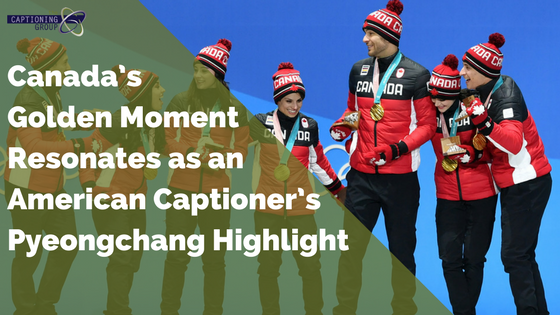In my 22 years of captioning, I’ve only captioned the Olympic games one other time, the 2008 Summer Olympics XXIX Beijing. I remembered very well all the prep, the papers all over my office, the briefs to memorize or at least be able to locate.
Olympic Jitters
The Olympics — for captioners, it brings up the fears…
How can I know all those athlete names, past and present?
How can I take over mid-way through an event and know which broadcasters are which?
Why can’t I recognize the last name of someone I know I’ve prepped for?
Wait, the schedule said I was captioning snowboarding, but that event has been cancelled. Now it’s speed skating and I didn’t prep for that!
It’s all of that, and more.
But once you settle in, find some amazingly helpful websites and receive help from fellow captioners, you can begin to–dare I say–enjoy it. Being an American doing Canadian coverage, it was interesting to me how quickly I became a fan of the Canadian athletes — in all sports, but especially in figure skating.
My Olympic “Golden Moment”
My Olympic highlight was Tessa Virtue and Scott Moir winning gold in ice dancing.
Of course I had heard of them, but I didn’t know a lot about them and I don’t recall seeing them skate before these Olympics. This pair, together for 20 years, since they were 7 and 9 years old, longer than any other pair in Canadian history, are unique. The chemistry is unmistakable.
As they skated the short program, you knew it was something special. Finishing the short program, they were in first place, with 83.67 points, setting a new world record and breaking their own world record of 82.68. Already an impressive start for the pair.
Then came the long program. We watched and captioned pair after pair, knowing that Virtue-Moir were coming up, but so were Gabriella Papadakis and Guillaume Cizeron of France, who were ranked number one. I had become accustomed to CBC’s reporters for figure skating: Brenda Irving, Carol Lane, and Kurt Browning. I had become familiar with their coverage, critique, and knowledge of the history of the sport.
But, when Virtue and Moir took the ice, there was silence. Watching them perform, was beautiful, otherworldly, and they knew it…we all knew it.
To win, their score needed to be 3 points higher than they had scored all season — and it was. They ended up winning, beating Papadakis-Cizeron by less than 1 point. It struck me as if it was truly meant to be for them to win and for it to be their conclusion, if they so chose it to be.
WATCH THEIR GOLD-MEDAL WINNING SKATE HERE
I captioned the rebroadcast of it, so I did know what was going to happen during my block. For that next night, CBC put together a tribute to them with current and past skaters and coaches. It was during that tribute that I was drawn in, realizing what the pair had meant to the sport, to Canada, and to each other. It was a tribute fit for Olympic Gold Medalists, which these pair are and deserve to be.
That’s the Olympics…..It’s the dedication of the athletes, the years of training, the victories, the defeats and how the emotion of it can so deeply resonate — even for a girl from the U.S. and for Canadian athletes.
So, would I caption the Olympics again? Yes, of course. It’s a lot of work, but I took it as a needed mental break from the sometimes heartbreaking news, politics and meetings that we normally caption. It’s a lovely time to focus on the good, something we don’t often get to do.
Thank you, TCG, for the challenge and opportunity to make a fan of this American girl.
—
This article was written by Krista Kays, an experienced broadcast captioner with TCG.






